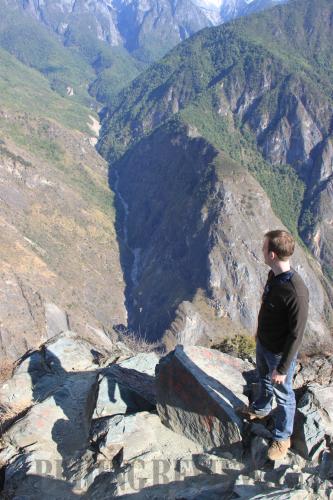|
 |
|
AWESOME MOMENTS: A hiker looks out over the Tiger Leaping Gorge (BRANDON TAYLOR) |
I can count the number of times I've had my breath taken away on the fingers of one hand. China takes credit for two of those instances. The first was my introduction to the noxious cloud of gray that hangs over Beijing. The second was standing atop a rock looking up and down the reaches of the vast Tiger Leaping Gorge in southwest China's Yunnan Province. Maybe it was the scenery at that very moment, the sun setting over an awe-inspiring landscape on loan from heaven, or maybe it was the fact that I'd been trekking for the better part of the day—either way, the air in my lungs was temporarily stolen from me. Then out came my camera and roughly 50 shots later I was ready to move on.
The Tiger Leaping Gorge is a backpacker's or woodsy outdoor folk's dreamland. One of the deepest river canyons in the world, the gorge is 14 miles of green hills, snowcapped mountains and rugged paths, with bending trails, cozy villages and waterfalls along the hiking trail. The gorge gets its name from a legendary tiger that while evading hunters jumped over the gorge at its narrowest point, which is about 100 feet.
Trekking the gorge at an enjoyable pace, stopping to smell the cherry blossoms and admire every stone formation, can take up to three days. My travel companion and I only had two days and a fairly leisurely itinerary.
We arrived at the entrance to the gorge later than we'd expected. A lack of buses, a lack of bus tickets and a lack of signs at the bus station had delayed our departure from Lijiang, a city about two hours from the gorge. After checking our larger travel bags at a hostel, we set out, agreeing that we'd just have to walk a little faster.
That was a mistake.
We started out strong, walking confidently toward the gorge on relatively stable terrain, but once we hit dirt trails and had to maneuver over boulders our pace began to slow with each step.
Probably the deeper-rooted problem was that we'd misjudged ourselves—neither of us was in trekking shape. At our hiking rate, we wouldn't make it to the gorge's peak before sunset, let alone a traveler's guesthouse an hour beyond that. Trekking at night was out of the question. One wrong step in the dark could send us falling over a near vertical cliff. Lucky for us, the cavalry soon arrived.
Since we started out, two men on horseback had followed us. They had offered to take us to the peak for a fee; on horseback it would only take a few hours. We wanted to walk the "real way" and said, "no thanks."
But the duo followed anyway. Their horses had small bells hanging from the saddles. As we went up steep hills, the bells would jingle; as we traversed rocky terrain, more jingling. There was jingling all the way as we walked along the trail. Jingle, jingle, jingle—it was the sound of our salvation.
After about two hours of hiking on our own, and now covered in sweat and extremely behind schedule, we had a change of heart and saddled up. Once on horseback, we reached the peak with ease, shot off another hundred photos, and made it to the village as the sun retreated behind one of the snow-covered peaks on the opposite side of the gorge.
The next morning we got up early before the afternoon heat could slow us down again. A mostly downhill trek, the second half was a breeze, albeit hard on the knees. Since we didn't have to rush, we were able to stop and enjoy the scenery around us.
The path took us past fields where people were busy harvesting wheat or planting other crops. Flowers were in full bloom, adding red and yellow spots to the green terrain. At each sleepy little town a few farm animals greeted us as they wandered about unattended. Their masters were tending the fields nearby.
Three hours later, we made our way down a few steep hills to the main road through the gorge and were reconnected with civilization.
While a tourist hotspot, the Tiger Leaping Gorge is a far cry from being anything remotely touristy. Being stuck out there among the trees, gentle mountain breezes and winding trails had a rejuvenating effect on me. While physically exhausting, by the end of my trek I felt relaxed and comfortable, enjoying a nice hiker's high. I slept soundly the next night and woke up re-energized, something I wish I could pull off back in Beijing.
The author is an American living in Beijing | 